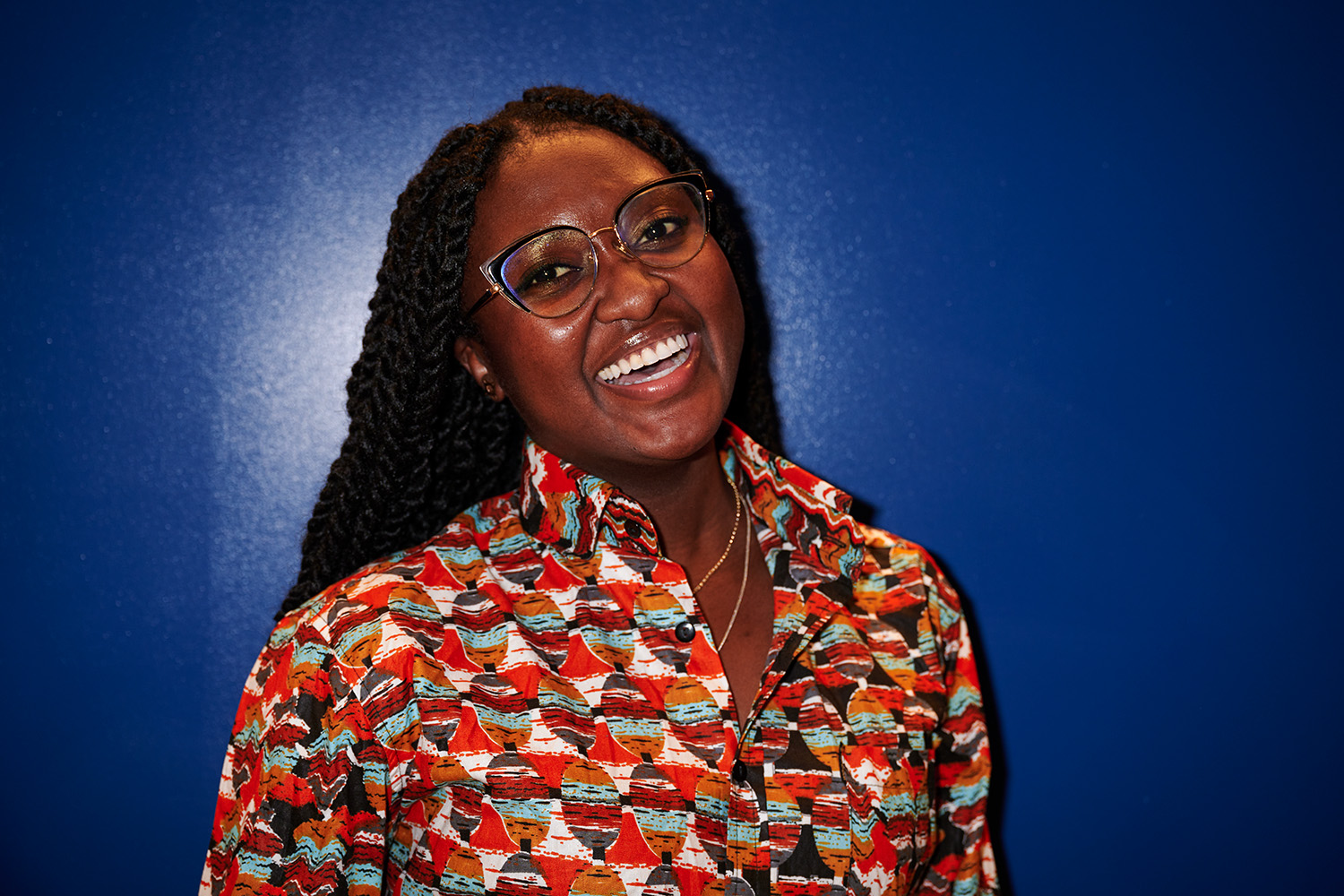“That’s my Calling”
Naadu Adjoka-Nartey knows UConn is the right school (times two) and family practice is the right profession

Celebrating her Ghanaian culture, Naadu Adjoka-Nartey wears a shirt of Ankara, or African wax print fabric, characterized by bold colors and designs.
On a recent weeknight in Storrs, Naadu Adjoka-Nartey ’16 (CAHNR), ’24 MSN was taking a rare breather from work and studies. A second-year master’s student in the Family Nurse Practitioner program at UConn School of Nursing, Adjoka-Nartey also holds down a job as a tier III clinical nurse at busy Yale New Haven Hospital.
Between overnight hospital shifts, classwork, clinical rotations, and supervising Emergency Department techs and others in Yale New Haven’s teaching program, Adjoka-Nartey has developed a few ways to relax and recharge. One is to hit the bike path near her home in West Hartford for fresh air and exercise.
“The fun thing is I can listen to my lectures while I ride,” she says, laughing. “So I’m able to take care of myself but also not be crippled with the anxiety of not actively learning!”
Another outlet is Grad_BlackSTEM, a UConn student organization that regularly sponsors meet-ups, lectures, and networking events.
“We’re a community of graduate students who identify as Black and are in STEM majors,” Adjoka-Nartey says. “We try to provide a supportive place to connect academically and professionally. We have people in engineering, health care, earth sciences. We have people in mathematics. I think it creates a positive impact in the Black STEM community, but also at UConn as a whole. We’re better UConn students for learning from one another — and we’re better people in the community.”
Strictly speaking, club events are not entirely recreational for Adjoka-Nartey. She serves as the group’s president. On this particular evening, she was helping to put on a cultural exchange night, where members from around the world give brief presentations about their countries, share traditions, and bond over grad school experiences.
“There’s food and everyone is dressed up in their gear,” says Adjoka-Nartey, who was born and raised in Accra, Ghana, before coming to the United States as a teenager. “It’s one of my favorite events. It’s exciting just to celebrate culture.”
“We’re better UConn students for learning from one another and we’re better people in the community.”
As a student and a nurse, she says she is always looking for ways to build connections among people. She remembers choosing UConn as an undergraduate in part because it felt like a place that could be as big or as small as someone wanted it to be. On the one hand, it was a global university. On the other, it nurtured and supported students as individuals, offering different points of contact within the larger community.
“I wanted to go to a school where I would meet other Ghanaian people, other African people, and people from other continents and backgrounds,” Adjoka-Nartey explains. “That was very important to me. And having been able to do that as an undergrad and now as a graduate student has been very interesting. You see that the school becomes bigger and bigger and yet smaller and smaller.”
When she completes her MSN in May and gets certified, she plans to practice in neighborhoods afflicted by lack of health access and poor health literacy, places where people end up using the emergency room for even minor issues.
The dearth of primary-care resources produces poor outcomes for everyone. Patients who rely on hospitals for initial contact may not be getting adequate preventive care to begin with and, after discharge, are at risk of missing follow-up treatments. Meanwhile, emergency rooms are overwhelmed by people who aren’t having emergencies, straining the entire system.
“I want to be part of the movement to increase health equity in the communities that need it most,” says Adjoka-Nartey. “That’s my calling, that’s what I really want. To be able to bring resources to people affected by health disparities.”
One key to patient-centered care, Adjoka-Nartey believes, is a provider’s ability to collaborate with patients. Every person coming through the door of a primary care facility arrives with unique issues and a varying ability to articulate them. Effective treatment begins with the provider figuring out where the patient is coming from, listening carefully to what they are saying — or possibly not saying.
She cites the example of a woman who presents for prenatal care. During examination, the patient gives off nonverbal cues that cause the nurse to suspect she’s in an abusive relationship. But the partner is present and the woman’s not talking. On the fly, the nurse must find a way to extract the critical information.
“I’m really excited about my future as a family nurse practitioner,” Adjoka-Nartey says. “There are just so many things that require collaborative care with the patient. Through teaching, patient education, evidence-based practice, I’ll be in a unique position to do that.”
By Kevin Markey
Photo by Peter Morenus

Leave a Reply